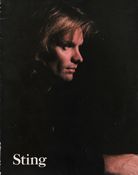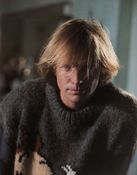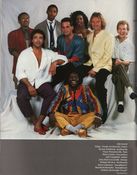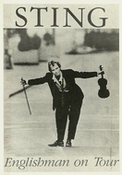
Nothing Like The Sun
Aug
21
1988
Bristol, CT, US
Lake Compounce Festival Park
Sting delivers expected thrills, but no more...
Being brilliant bears a burden, particularly when it comes to being a pop master like Sting. Anticipation often runs so high, as it did for the 19,000 fans who packed Lake Compounce on Sunday night, that in the end, a sense of lingering disappointment, of unfilled expectations, can't be erased.
Yes, the 19-song, two-hour show was solidly entertaining. But Sting, who ranks with today's heavyweights of pop music, somehow has to do more. Sting uses innovative and intelligent weaving of reggae and rock - first with the Police and now on his own - adding jazz touches and Third World beats.
Fronting an enthusiastic eight-member band, Sting, with long, loosely pony-tailed hair and dressed in blue, concentrated mostly on material from his 1987 album, '...Nothing Like The Sun'. 'The Lazarus Heart', 'Be Still My Beating Heart' and 'Rock Steady' all rode the same Sting-made musical wave with their bobbing rhythms and plenty of soft horn blowing by Branford Marsalis. Those mid-tempo songs, none of which crested, but rather slithered along, set the night's often-controlled mood.
Sting enjoyed reworking older songs, giving them new interpretations. Sometimes it worked, sometimes it didn't. He successfully turned 'When The World is Running Down' into a Prince-like jam, complete with slamming keyboards and percussions. But he failed on his hodge-podge run-through of the Police's 'Don't Stand So Close To Me', trying to mesh the song's original up-beat Caribbean flavor with the band's 1986 syrupy slow remix version. Not a good idea.
Sting not only reworked songs' sound, but their attitude. He took the serious call for world peace of 'One World' and turned it into a fun dance number. Then, by dedicating his former Top 40 dance single 'Set Them Free' to Nelson Mandela and all the children in South African jails, he whipped the song's once throwaway chorus, ''Free, free. Set them free'' into a strident political battle cry.
As a songwriter, Sting has often celebrated painful topics. At first with the Police he centered on lost love and loneliness. His closing, and by now familiar accoustic, 'Message In a Bottle' still carried an authentic hurt with it. Recently Sting has sung of the powerless and oppressed of the world.
'They Dance Alone', an empathetic ode to Chilean women who dance for the sons, husbands and fathers who have ''disappeared,'' sent chills up the spine as Sting sang, ''Can you think of your own mother dancing with her invisible son?''
But, like 'Message In a Bottle', which ended as a feel-good clap along, Sting sang with hope in his heart of a fruitful future for the lonely women: ''One day we'll laugh in our joy. And we'll dance.''
Those moving moments were few however, and Sting was content to deliver the expected goods. While that in itself is a triumph, the untapped potential could not be ignored.
(c) The New Haven Register by Eric Boehlert
Being brilliant bears a burden, particularly when it comes to being a pop master like Sting. Anticipation often runs so high, as it did for the 19,000 fans who packed Lake Compounce on Sunday night, that in the end, a sense of lingering disappointment, of unfilled expectations, can't be erased.
Yes, the 19-song, two-hour show was solidly entertaining. But Sting, who ranks with today's heavyweights of pop music, somehow has to do more. Sting uses innovative and intelligent weaving of reggae and rock - first with the Police and now on his own - adding jazz touches and Third World beats.
Fronting an enthusiastic eight-member band, Sting, with long, loosely pony-tailed hair and dressed in blue, concentrated mostly on material from his 1987 album, '...Nothing Like The Sun'. 'The Lazarus Heart', 'Be Still My Beating Heart' and 'Rock Steady' all rode the same Sting-made musical wave with their bobbing rhythms and plenty of soft horn blowing by Branford Marsalis. Those mid-tempo songs, none of which crested, but rather slithered along, set the night's often-controlled mood.
Sting enjoyed reworking older songs, giving them new interpretations. Sometimes it worked, sometimes it didn't. He successfully turned 'When The World is Running Down' into a Prince-like jam, complete with slamming keyboards and percussions. But he failed on his hodge-podge run-through of the Police's 'Don't Stand So Close To Me', trying to mesh the song's original up-beat Caribbean flavor with the band's 1986 syrupy slow remix version. Not a good idea.
Sting not only reworked songs' sound, but their attitude. He took the serious call for world peace of 'One World' and turned it into a fun dance number. Then, by dedicating his former Top 40 dance single 'Set Them Free' to Nelson Mandela and all the children in South African jails, he whipped the song's once throwaway chorus, ''Free, free. Set them free'' into a strident political battle cry.
As a songwriter, Sting has often celebrated painful topics. At first with the Police he centered on lost love and loneliness. His closing, and by now familiar accoustic, 'Message In a Bottle' still carried an authentic hurt with it. Recently Sting has sung of the powerless and oppressed of the world.
'They Dance Alone', an empathetic ode to Chilean women who dance for the sons, husbands and fathers who have ''disappeared,'' sent chills up the spine as Sting sang, ''Can you think of your own mother dancing with her invisible son?''
But, like 'Message In a Bottle', which ended as a feel-good clap along, Sting sang with hope in his heart of a fruitful future for the lonely women: ''One day we'll laugh in our joy. And we'll dance.''
Those moving moments were few however, and Sting was content to deliver the expected goods. While that in itself is a triumph, the untapped potential could not be ignored.
(c) The New Haven Register by Eric Boehlert









